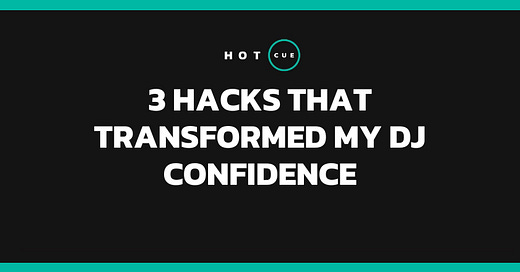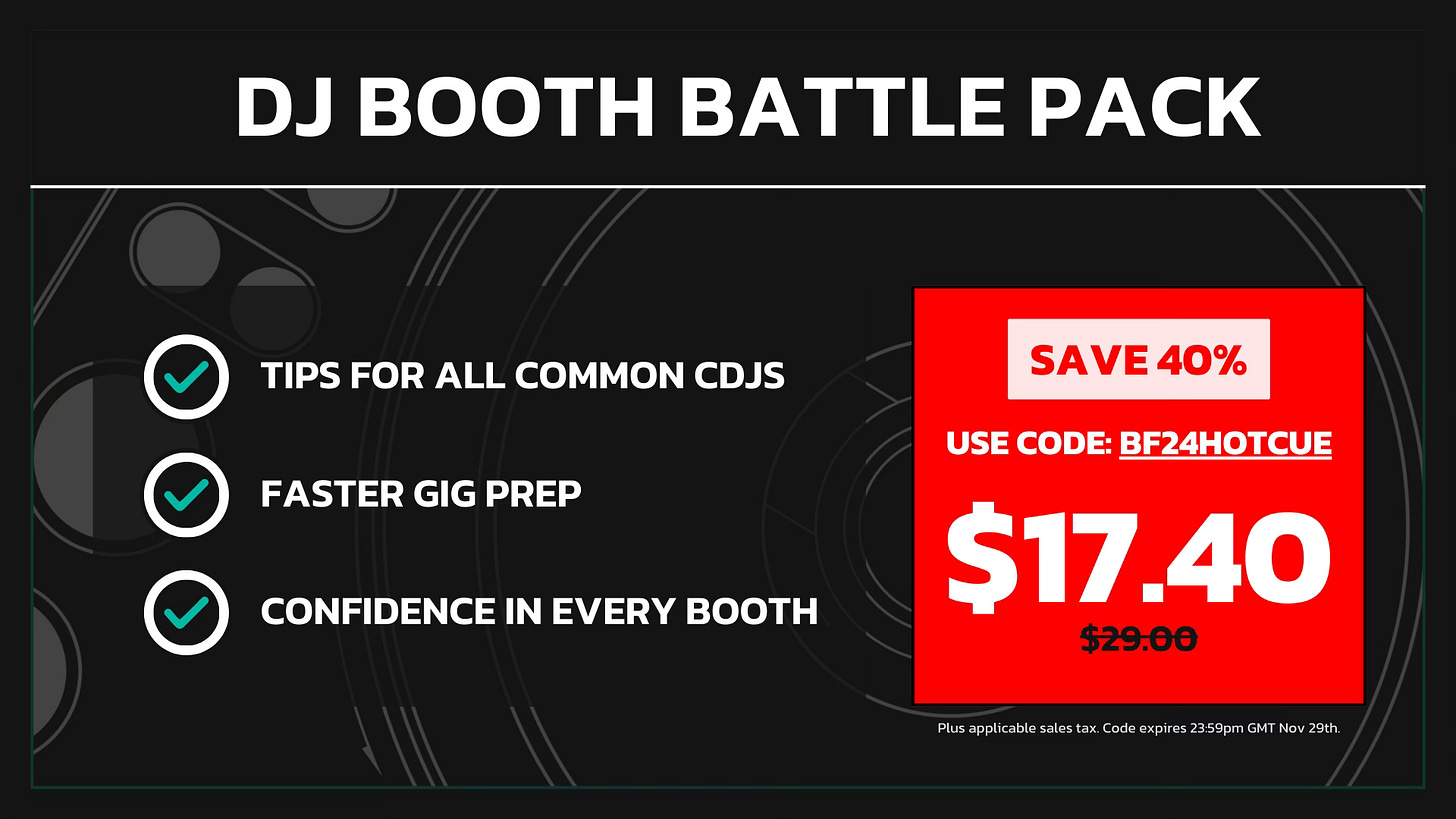Hi there Phaser Pilots,
Have you ever noticed how some people appear unsure of themselves? It makes it harder to trust them, listen to what they have to say or to take them seriously.
This, incidentally is the story of every beginner YouTuber. And indeed was the case for my early videos (don’t you dare go back and watch them). But it also applies to DJs.
Back in the days when I played out at my student union and the occasional local club the truth is I felt like I didn’t belong there - and you could tell.
I was pooping my pants so much that I messed up easy mixes, didn’t look up from my decks the whole set and had cold sweats when the equipment didn’t work properly.
So what is it that makes some DJs appear like they don’t have a care in the world, even when things go wrong - and others appear like they want to melt into the floor?
In this email I want to talk about 3 things that helped me get more confident behind the decks and actually enjoy being in front of all those people.
1. Get handy
I think muscle memory is underrated. Brain memory gets all the limelight.
But the truth is, the less you have to think about what you are actually doing, the easier it is to do it. And the easier something is, the more confident you get.
It’s how musicians can play their instruments without looking at their hands. How jugglers can throw and catch balls whilst riding a unicycle and making toddlers cry. Or how pro DJs have time to do Jesus poses without stressing about missing their next mix.
This isn’t about learning every single feature on your decks. It’s about instinctively learning the hand actions to pull off the most common things you’ll do on the decks.
Back when I played on vinyl I developed a ‘feel’ for certain types of action. I learnt the exact amount of pressure I needed to put on the record to slow it down. I learnt the correct amount of ‘twiddle’ to put on the spindle to speed up the platter. And I learnt how to move my hand so I didn’t whack the needle doing both of those (usually).
Over time this helped me trust what my hands were doing so I could focus more on track selection and engaging with the crowd.
💡 Try this: Close your eyes and try and mix a track in using the jog on your gear. Don’t worry about headphones. Practice the movements you need to speed up/slow down the track by the correct amount. Level it up by also trying to use the EQs, and by doing it on both sides of the controller.
But what if you are playing in clubs or bars and don’t have CDJs at home to practice on?
🏷️ 40% Off The DJ Booth Battle Pack
A DJ playing in clubs will have infinitely less deck time on the real gear they need to get comfortable on.
That’s why I’ve condensed 100+ hours of research digging through manuals, firmware updates and interviewing gigging DJs to create the DJ Booth Battle Pack.
It’s an easy to follow guide that explains the exact differences between common CDJ models that can trip you up and cause mistakes.
And this Black Friday it’s 40% off for a limited time* for subscribers of this newsletter.
Just use code BF24HOTCUE at checkout*
2. Rule the world

Have you ever been invited to an event, let’s say a wedding or even a job interview.
But you don’t know what to wear, and the invite doesn’t say anything. Is there a dress code? What if you wear the wrong thing? What if my Air Force 1’s aren’t cool any more?
Because the rules aren’t clearly stated it makes it an incredibly stressful experience.
If your DJ library has no rules, you are going to run into the same problems:
How do I know what goes with what?
What if I don’t have enough time to find a place to mix in?
Why did I set that cue there?
I’ve been using a cue point system for a long time now which helps give me confidence in my track selections, and my ability to mix and understand them.
If you don’t have a cue point system set up yet, now could be the time to start. It’s helped me:
Quickly understand track structure (especially when it’s unusual)
Mix in new tracks faster
Save loads of time so I can audition more tracks before choosing one to mix in
A good cue point system helps guide you through your library, reducing confusion by setting simple rules that take the guesswork out of your DJing.
If you want to learn more about how to implement one I’ve done a full video on the channel. It even has a free template you can use to get started straight away.
3. Build a life raft (or two)

Even pro DJs mess up - so it’s important to have coping mechanisms to deal with when things go wrong. I know I’ve often lost confidence/motivation in an entire set just because of one slightly dodgy mix.
Tip 1
As you DJ you’ll inevitably find some tracks that you just love mixing together time and time again. You can do it in your sleep, and with high accuracy. And you know the crowd responds well.
That’s why I’ve found it’s a good idea to keep a playlist of these go-to blends. I sometimes use them to improve my mood quickly so it doesn’t affect the rest of my set. It’s kinda like comfort eating ice cream after a breakup.
Tip 2
Once I was playing at a club in London and the entire sound system cut out for a good 10 minutes, which is not an uncommon occurrence in clubs even today.
After the problem gets fixed you have to get the crowd (or yourself) back on side fast. The last thing you want to be doing is scrambling looking for the right track to play.
That’s why I recommend looking through your library and identifying what I call ‘restart’ tracks. These are essential to have to hand should the worst happen and the sound cuts out completely.
For me a good restart track really ramps up the energy through a shortish intro. But many different approaches can work.
If you are interested, the one I used was Josh Wink - Higher State of Conciousness
💡 Try this: Look through your DJ library and find at least 5 tracks that inject energy fast. Set cue points so that you can get back into the music as fast as possible
What tips have helped you be confident when you step up to the decks?
Catcha next time!
Have your say
Rekordbox is powerful, but it’s hard to figure out how to use it to its full potential. I’m working on a solution, but first I need your input to identify where the knowledge gaps are.
If you’ve taken a Rekordbox course and not found it valuable I’d love to know why in the comments - or you can simply reply to this email.
*Code expires 23:59pm GMT on Nov 29th









Who needs a Rekordbox course, when you're videos are so spot on that it's already improved my workflow an incredible amount?
Not to mention, you're hilarious.
I do have a question though... Why so much hate on the Tech House?
I’ve been doing this since 1973. Spent 1976-1983 at a club The Pier in DC. Now that it’s all digital and I’m not getting any younger, I play for house parties and give my friends CD s or 80 minute tracks using Dropbox and soon SoundCloud.